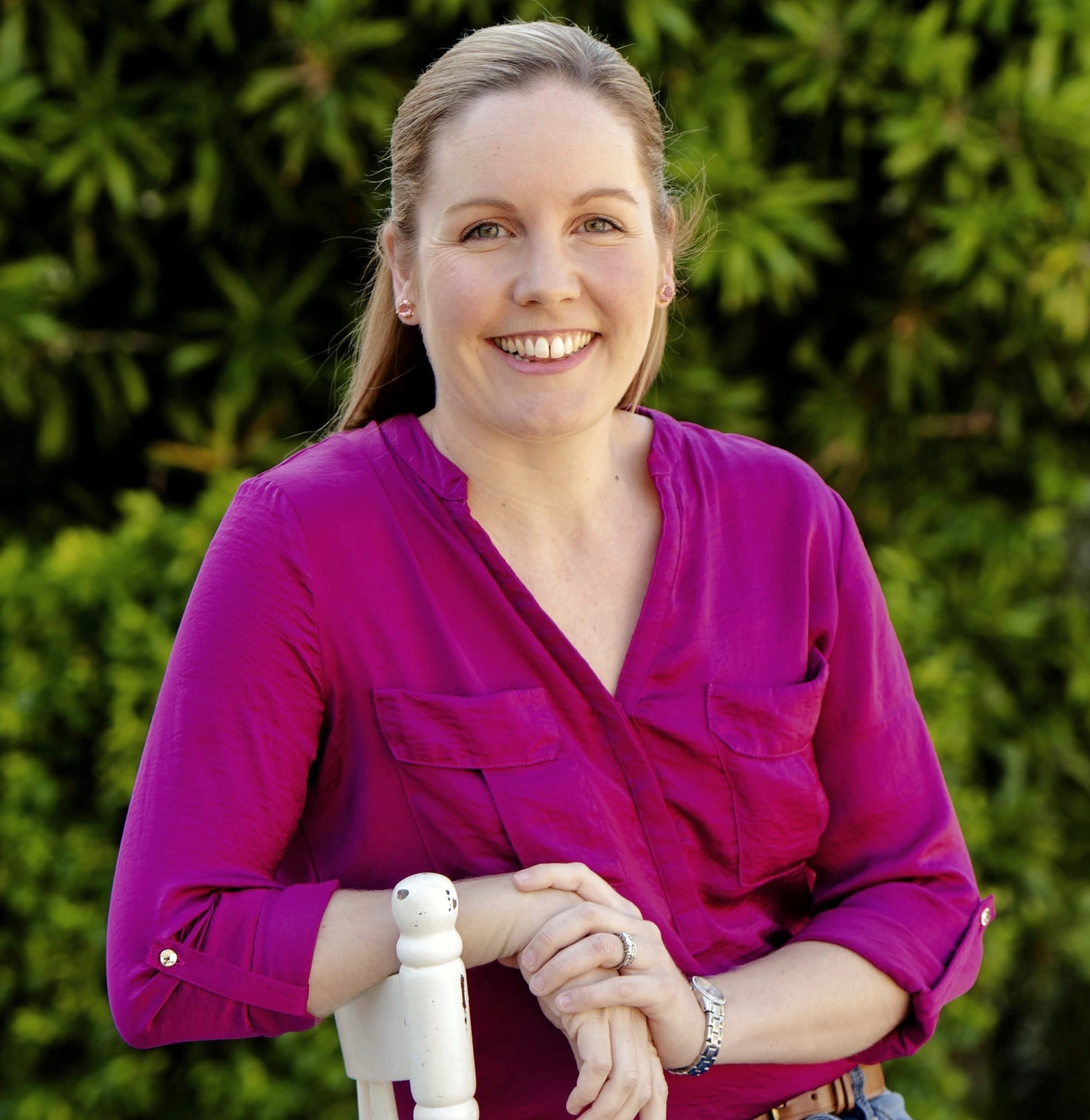
The festive season is fast approaching, and there’s no better way to soak up the Christmas cheer than by joining in some of the magical events happening across Brisbane, Ipswich, and the Gold Coast. From twinkling lights to carols under the stars, here’s your guide to the best family-friendly Christmas experiences this December.
The season wouldn’t be complete without the sound of Christmas carols filling the night air, and South East Queensland delivers in spectacular fashion.
Returning for its 14th year, this much-loved event at HOTA, Home of the Arts, promises two magical nights of festive music and family fun on Saturday 6 and Sunday 7 December. Tickets are required for entry, but you can also catch the live screening from the HOTA Parklands, free and no tickets required. Pack your picnic rug, grab a bite from the food trucks, and enjoy the show under the stars.
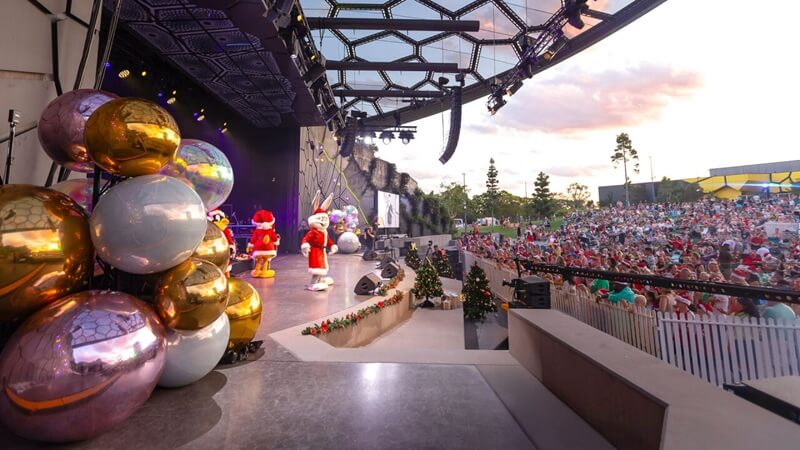
Head to Riverstage on Saturday 6 December 2025 for Brisbane’s biggest Christmas party. Featuring live music, star-studded performances, and plenty of sparkle, this annual event captures the spirit of the season perfectly. If you miss out on tickets, don’t worry, the show will also be livestreamed to Roma Street Parkland, complete with pre-show entertainment and food trucks.
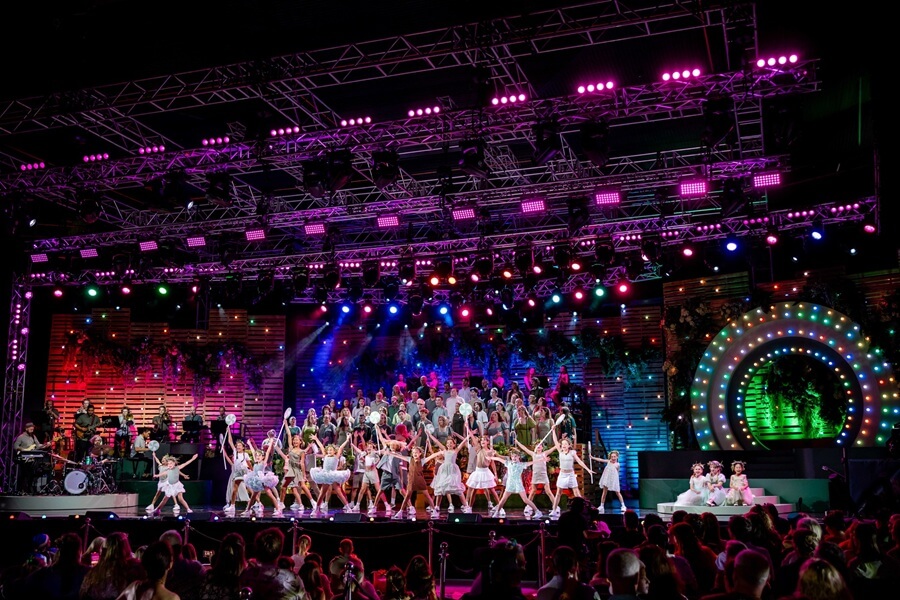
For a relaxed, family-friendly celebration, the City of Logan Christmas Carols are not to be missed. Running from 3pm to 8pm on Saturday 6 December at Griffith University Logan Campus, this free event offers markets, food stalls, live music, and free rides, capped off by a spectacular fireworks finale. Tickets are not required for this one, so you can simply show up and set up your picnic!
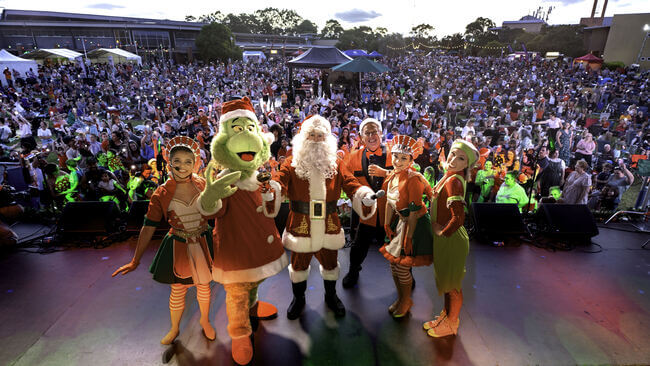
On Saturday 13 December, Robelle Domain will light up with live performances, delicious food trucks, market stalls, and fireworks at 8:30pm. It’s a community favourite for both children and grown-ups alike. No tickets required.
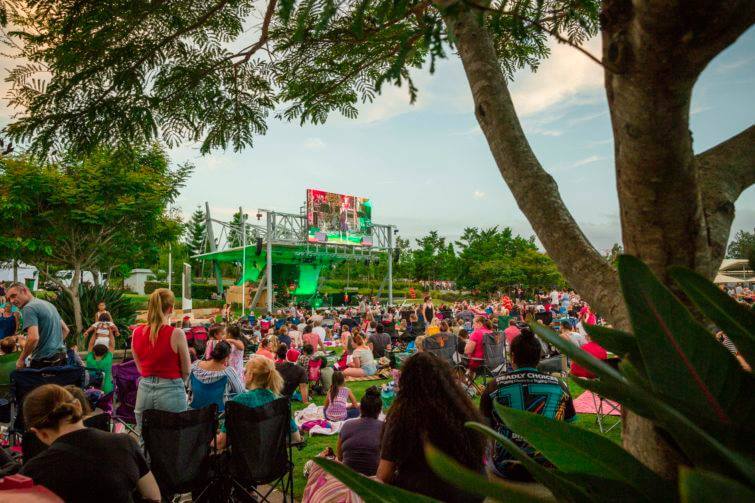
This December, Broadbeach Mall will transform into a magical gingerbread village, offering free festive fun for the whole family. From Monday 15 to Sunday 21 December 2025, the space next to The Oasis Shopping Centre will burst with colour, creativity, and Christmas spirit.
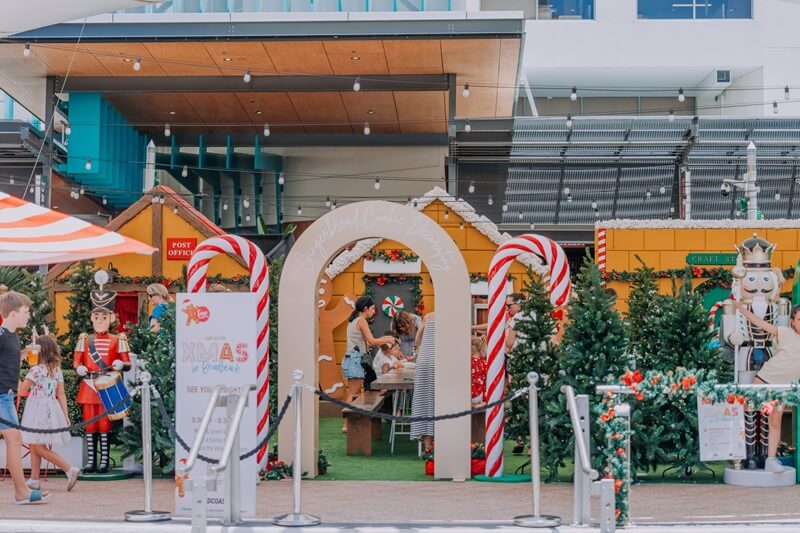
During the daytime sessions (10am – 3pm daily), families can dive into festive workshops—decorate your own gingerbread cookies, enjoy Christmas craft sessions, and settle in for storytime theatre. Each one-hour session includes all activities, but bookings are essential.
Little adventurers can also take part in The Oasis Treasure Hunt, collecting a map and following clues to uncover hidden surprises throughout The Oasis Shopping Centre. No bookings required for this one.
For those in the northern Gold Coast, Christmas in Coomera brings a full weekend of free festive fun, with activities running across Saturday 20 and Sunday 21 December. Families can dive into the celebrations with a lively DJ dance party complete with snow machines and surprise performances, or try their hand at the North Pole Putt Putt course. Little ones will love spotting stilt-walking candy canes, Rudolf, Hip Hop Santas and even the Grinch as they roam the precinct bringing Christmas cheer. Of course, Santa himself will make special stage appearances throughout the event.
Between face painting, photo moments in Santa’s sleigh or on his throne, and plenty of roving entertainment, there’s something to keep every age smiling. It’s also a great chance to tick off some last-minute shopping with market stalls offering unique gifts and stocking fillers, while food trucks serve up tasty bites for hungry families. If you’re looking to add a joyful, high-energy outing to your Christmas calendar, Christmas in Coomera is the perfect way to celebrate together.
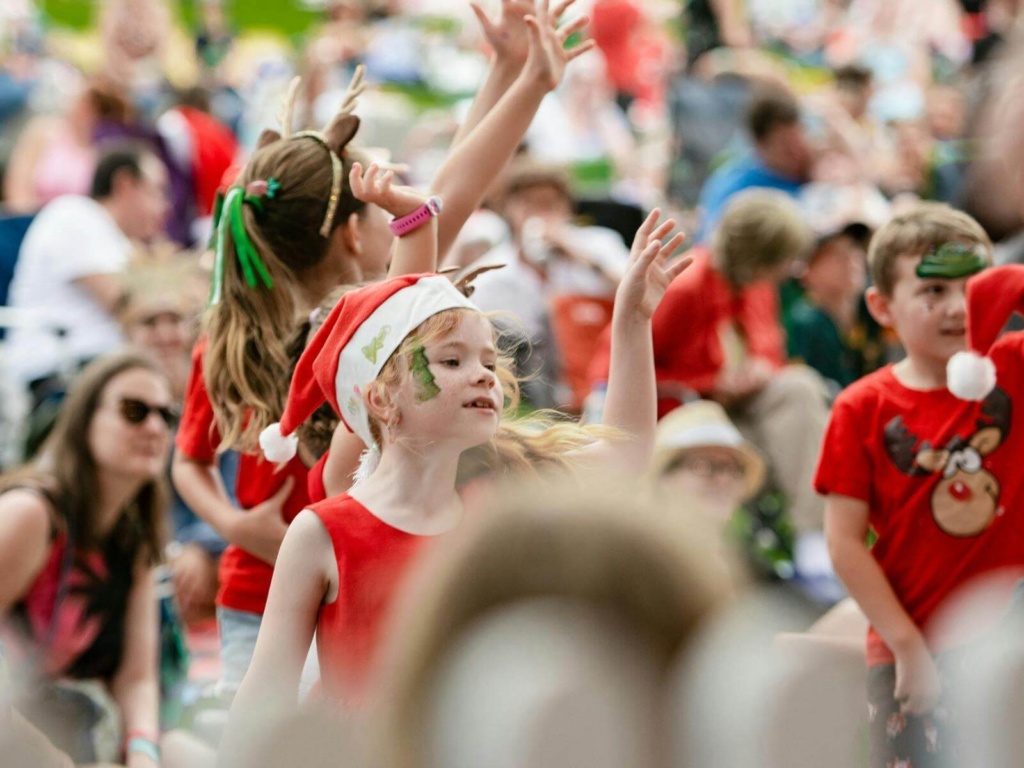
For a unique twist on holiday celebrations, don’t miss Santa and Sirens at the Nicholas Street Precinct on Thursday 27 November (5pm–7pm). This free event combines festive fun with a tribute to our real-life heroes, showcasing emergency service vehicles decked out in Christmas lights. Families can snap photos with Santa, enjoy live carols by Journey Church, and stay to witness the official lighting of the City Christmas Tree in d’Arcy Doyle Place at 6:45pm.
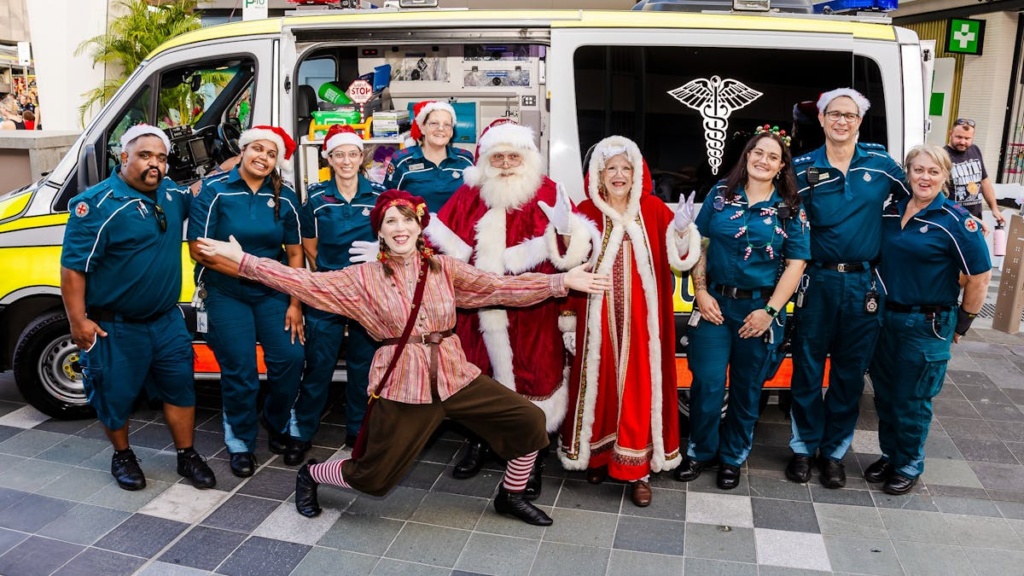
Finally, round out your Christmas adventures with the Brisbane City Hall Light Spectacular. Beginning 5 December, King George Square comes alive each evening as dazzling projections light up City Hall’s historic façade. It’s a breathtaking visual display of festive storytelling that will delight families of all ages.
Whether you’re decorating gingerbread in Broadbeach, singing carols under the stars, or taking in some stunning lights, there’s no shortage of ways to celebrate this Christmas season. Gather your loved ones, embrace the sparkle, and make this festive season one to remember.

If you’re looking for early education and care for your young family, look no further than Little Scholars!
We offer your child the very best facilities, resources and early educational, play-based programs available, which are underpinned by the early years learning framework. We also believe in fun, wide-ranging experiences so that children can begin to develop interests and passions of their own, from Bush Kinder adventures to our broad extracurricular program which includes swimming for our kindergarten children, we believe in keeping wonder and magic in childhood.
Find Lara’s recommendations at her website Mrs. Lardeedah.com, and follow her socials Facebook and Instagram

There is something magical about creek days with little ones: bare feet in cool water, sandy toes, the sound of gentle trickling streams, and endless opportunities for simple, unplugged fun. The Gold Coast is best known for its beautiful beaches, but you can discover some incredible rockpools and creeks perfect for toddlers and young children. Here are five family-friendly spots where little feet can paddle safely, explore nature, and make a splash.
Best for: A classic hinterland swimming adventure with shallow spots for toddlers and deeper pools for older children.
Just a 15–20 minute drive inland from Currumbin Beach, this natural swimming spot is surrounded by lush greenery. It’s a local favourite for good reason.
There are BBQs, picnic tables, grassy areas and toilets, making it easy to settle in for a relaxed family day. Keep in mind that it is extremely popular on warm weekends and you will need to arrive early to get a car park!
Best for: A peaceful, easy-access creek spot perfect for younger children.
Just down the road from the Currumbin Rock Pools, Long Tan Park is a lovely, often quieter alternative for families.
It’s a brilliant spot for families with toddlers or preschoolers who want a gentle, nature-filled adventure without the hustle and bustle.
Best for: Calm, sheltered creek paddling just a short walk from the café strip.
Instead of the busy Pirate Park, Palm Beach access point to Currumbin Creek, head a little further down the road to Apex Park. Here you get easy access to Currumbin Creek for a peaceful, shady paddling experience.
Best for: A peaceful rainforest adventure with shallow natural pools.
At the very end of Currumbin Creek Road, you’ll find the Cougal Cascades walking track. This is a short, pram-friendly path through beautiful rainforest that leads to:
There are no cafes or playgrounds here, so pack snacks, towels and enjoy the serenity. It’s a lovely spot for a half-day nature escape.
Best for: Creekside paddling with a city-meets-nature vibe.
Looking for something closer to home? Tucked away just a few blocks from the bustle of Surfers Paradise, Budds Beach feels like a hidden gem.
This is a brilliant choice for families who want easy access, a quick paddle, and facilities close by without trekking too far inland.
Rockpools and creeks offer something beaches sometimes can’t: calm, clear water, natural shade, and a slower pace that suits young families perfectly. However, it is very important to ensure your day at the creek is safe and enjoyable. Supervise children closely – even shallow water can have slippery rocks or changing currents. The creeks are also home to a variety of wildlife, so always check before entering the water and don’t swim if you can’t see the bottom. Bring water shoes to help children with firm footing while exploring. Also, after heavy rain the creeks can flow faster than usual and have poor water quality. Check Council water quality reporting for updates on creek closures.
Whether it’s a rainforest dip at Cougal Cascades, a lazy paddle at Currumbin Creek, or a quiet splash at Long Tan Park, the Gold Coast has a creek adventure for every kind of family day out. So pack the towels and go exploring! These are the kinds of days little feet (and big hearts) remember.
If you’re looking for early education and care for your young family, look no further than Little Scholars!
We offer your child the very best facilities, resources and early educational, play-based programs available, which are underpinned by the early years learning framework. We also believe in fun, wide-ranging experiences so that children can begin to develop interests and passions of their own, from Bush Kinder adventures to our broad extracurricular program which includes swimming for our kindergarten children, we believe in keeping wonder and magic in childhood.
Find Lara’s recommendations at her website Mrs. Lardeedah.com, and follow her socials Facebook and Instagram
Planning the perfect holiday? These Gold Coast Kids Adventures are designed especially for families with little ones aged 0–5, offering safe, fun, and unforgettable experiences.
We get it. You’re on the Gold Coast, it’s raining (or blazing hot), and your small human has more energy than a double-shot espresso. You need indoor activities that are fun, safe, and don’t involve glitter in your carpet again.
Good news! We’ve rounded up the best indoor activities for children under 5.
Chipmunks kids’ indoor playground in Robina features dedicated play zones for different age groups, helping support development through active, social play. And the best part? There is an onsite café that overlooks the playground. Coffee for you, slides for them. Everyone wins.
Address: 86/112 Robina Town Centre Dr, Robina QLD 4226, Australia
Imagine trampolines, foam pits, and little legs flying through the air (safely!). Their Mini Bounce sessions are made especially for under 5s and is a perfect way to burn some energy while improving their balance and coordination.
Address: 5 Sunlight Dr, Burleigh Waters QLD 4220
Indoor playground meets imagination wonderland. There’s soft play, ride-on pedal car track, and a dedicated toddler area your child will never want to leave! Did we mention they have a full commercial café to entertain the adults too?
Address: 54 Paradise Ave, Miami QLD 4220, Australia
Bella’s Wonderland? An actual fairy tale. Bright colours, soft-play, sensory rooms, and climbing zones made for tiny hands and feet. Your child will feel like royalty and you’ll feel like a genius for taking them there!
Address: Unit 48 3/15 Jackman St., Southport QLD 4215, Australia
Expect a lot of pointing and “WHAT’S THAT?!” The Gold Coast Motor Museum is not just for car lovers (though they’ll be in heaven). This museum is filled with shiny vintage vehicles that spark big “vroom vroom” energy from even the smallest visitors.
Address: 107 Kriedeman Rd, Upper Coomera QLD 4209, Australia
You didn’t think we’d forget ourselves, did you? Our Little Scholars campuses are jam-packed with music time, sensory play, art, books, and learning disguised as fun. No matter the weather, every day is a mini adventure for our Little Scholars!
Little Scholars offers 17 purpose-built campuses across the Gold Coast, Brisbane, Redland Bay and Ipswich, designed to support your child’s development through play, discovery, and care. Each campus provides a safe, engaging environment where children aged 5 and under can thrive – rain, hail or shine.
Indoor play isn’t just a backup plan. It’s part of growing up strong, smart, and confident. When your tiny tornado is climbing, drawing, laughing, and pretending to be a dinosaur… they’re actually:
Once the skies clear, your little one will be ready to explore even more! Check out our guide to the best outdoor playgrounds in Redland Bay for toddlers – from shaded climbing frames to sensory play zones, it’s packed with parent-approved adventures.
Whether you’re a local or just visiting, the Gold Coast has so many ways to turn a rainy day into a magical one. At Little Scholars, we believe every day is a chance to grow, even when the skies are grey.
Book a tour of your nearest Little Scholars campus. We’ll be here – with blocks, bubbles, books, and open arms.

Are you looking for low-cost options to help the family stay cool this summer? The Gold Coast is home to a host of free or low-cost, family-friendly swimming spots that are sure to cool everyone off and provide hours of fun entertainment. Here are 8 spots to try this summer, from the northern most parts of the Gold Coast, right down to the southern Gold Coast.
Lions Park is located at the Jacobs Well Boat Ramp, and is a council-managed, netted swimming enclosure nearby the mouth of the Pimpama River. Here you will find a small sandy beach area with shade sails right up to the water’s edge, as well as barbeque and picnic facilities. This spot is great for younger children, as they can get a taste of the beach without large waves or long walks from the car to the water. Best visited at high tide, it can be a bit muddy at low tide.

Cabbage Tree Point is a small town just near Jacobs Well, with a boat ramp, small beach and Charlie Hammel Park. This is a great spot for the family to spend a morning – set up a picnic blanket under the trees by the ship-themed playground and enjoy a swim at the small, sandy beach. Again, being on the river this is best visited at high tide, but enjoyable all day long.

The Pimpama Sports Hub is the northern Gold Coast’s largest aquatic centre, with a 50-metre outdoor swimming pool, a 25-metre indoor swimming pool, learn to swim pool and a hydrotherapy pool. The children’s splash pad is exceptional, with water fountains, bubbling brooks and water at ankle depth – it’s ideal for toddler and primary school aged children.

A splash pad might be the last thing you would expect to find at a shopping centre, but Westfield Coomera has one of the best free waterplay areas on the Gold Coast. Designed to resemble a billabong, waterways weave around interactive play stations where children can play with squirting frogs and jump across stepping stones. There are excellent change room facilities available and a café next door.

Ian Dipple Lagoon is a great place to go for a swim. Protected by a large sandbank, this lagoon is wave free and perfect for little ones. There are shower and toilet facilities along the shore as well, making the pack up easy. In the evenings, the lagoon is floodlit, so it’s also a great spot for dinner time fish and chips.
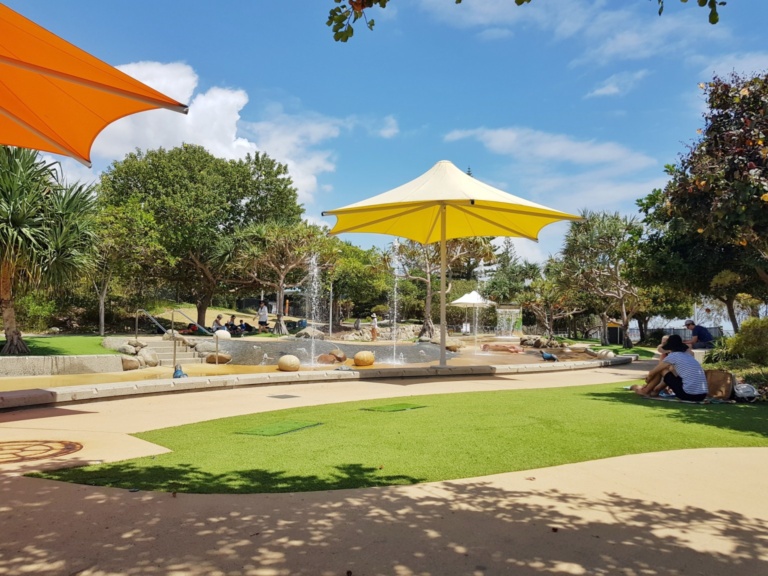
The Broadwater Rockpools might be the most popular water play space on the Gold Coast, with plenty of water fountains and vibrant marine-themed equipment to play with. The water play is built to resemble a creek bed, and it works like tidal rockpools with the water receding every 5-10 minutes and then returning again. The Rockpools are watched over by lifeguards during opening hours and it’s completely free to play.

Located within the Home of the Arts precinct, Evandale Lake is a popular swimming spot for Gold Coasters. With a sandy beach around the outside, the lake has shallow edges but can be deceptively deep as you get further in. Families love to spend the day here, making the most of weekend food markets or a picnic lunch. There is a fun shaded playground by the lagoon too.

The newest water play destination on the Gold Coast, the Palm Beach Aquatic Centre opened at the end of October and now has a 50m outdoor pool, 25m outdoor pool, indoor warm water program pool, 25m indoor learn to swim pool, and an outdoor splash pad. The splash pad at Palm Beach is fairly simple in design, with plenty of sprayers along the ground as well as a few water play towers and spinners, but it is made entirely of a rubber base which is absolutely ideal for those crawling or learning to walk!
If you’re looking for early education and care for your young family, look no further than Little Scholars!
We offer your child the very best facilities, resources and early educational, play-based programs available, which are underpinned by the early years learning framework. We also believe in fun, wide-ranging experiences so that children can begin to develop interests and passions of their own, from Bush Kinder adventures to our broad extracurricular program which includes swimming for our kindergarten children, we believe in keeping wonder and magic in childhood.
Find Lara’s recommendations at her website Mrs. Lardeedah.com, and follow her socials Facebook and Instagram
Do you have a child who’s struggling with separation anxiety, especially at when being dropped off at school or early education? Perhaps they’re going through a developmental milestone that makes them need Mum or Dad a bit more than before. This is common starting around six months of age, peaks at 14-18 months, then can happen again when your child hits preschool and school-age. Or maybe your child is new to our service or has recently transitioned studios. The transition from home to early education is a milestone for both children and families. Separation anxiety can even happen for children who’ve been in Little Scholars for a while. It can be hard moving into a new studio where she or he doesn’t yet know new routines, where things are kept and spending time with different educators with different ways of doing things can be overwhelming for the child. This is all normal.
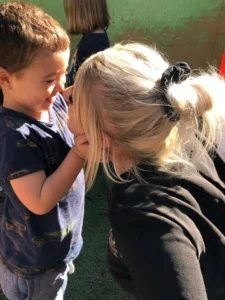
If you’re at a loss on how to make things easier on your little one, and yourself, we have some ideas.
Acknowledge and validate their feelings by saying something like “I know goodbyes can be hard, but I always come back. I will see you later today. I love you.” Give a big hug, a smile and a wink.
Then at home, if your child is old enough, have a chat about why she/he is having a hard time at drop-off, and think about what you can do to alleviate it. Ask him or her what make things easier. Perhaps it’s including a comfort toy, blanket or family photo. Maybe you each have a special bracelet that you can touch when you’re missing each other. Make a plan for something special together when you pick him or her up, like a walk or playing a game together, which will give your child something to look forward to through the day.
If you’re preparing your child to go to early education or school, it’s best they understand what their days will look like. So the conversation could look something like ‘we’ll all have breakfast together and get ready for the day. Then we’ll get in the car and first we’ll stop at Little Scholars. I’ll walk you in, give you a big hug, and you’ll go off to have a day of play while I go to work. When I finish work, I’ll jump in the car and come right over to pick you up, then we’ll go _____” These conversations may have to happen several times for it to sink in.
Also, if you’re pondering signing your child up for early education, this is why we offer play dates to children newly enroled but yet to start – this allows them to begin to become familiar with their new educators and studios.
Remember, you can always chat with your educator or campus manager about how to help. We’re always available, and we’ve been through this before, we can offer ideas or reassurances everyone will be OK!
We also know separation anxiety can be a two-way street, especially for new parents, or returning to work after maternity leave. Don’t forget we have our Little Scholars app so you can see pictures of your child, and be reassured that if there were tears from your child, they likely didn’t last long and they’re busy having fun and learning while you’re at work.
Related links:

Grandparents have always shared a special bond with their grandchildren, but nowadays they are also playing an increasingly important role as a caregiver, as children spend much more time with their grandparents than ever before. Sometimes however, the generation gap can make it hard to think of new and fun things to do together that appeal to everyone.
Whether the grandchildren are spending an afternoon, a weekend, or the school holidays with you, this list is sure to keep children and grandparents of all interests and physical abilities, entertained and making memories year-round.
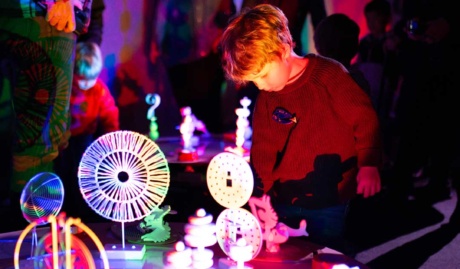
Each year, World Science Festival Brisbane paints the town red and takes science out of the laboratory and into the streets, parks, museums, galleries and performing arts venues of Brisbane and regional Queensland! World Science Festival Brisbane offers interactive and informative experiences for inquisitive young minds, with a huge range of family-friendly events and workshops.
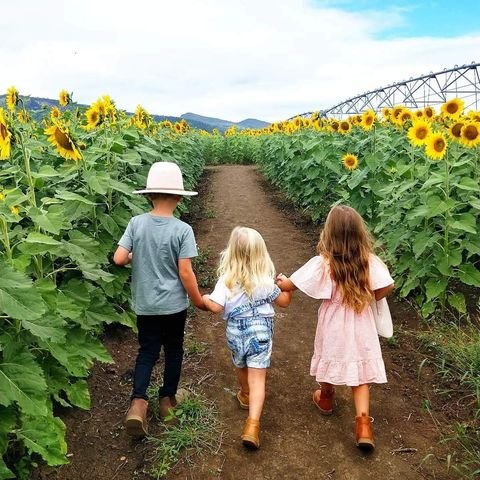
Gather your family and friends and join in a fun weekend in the Scenic Rim region, filled with live entertainment, workshops for children, cooking classes, mini photo sessions, arts, crafts and much more. Don’t forget the star of the show – strolling through beautiful sunflower fields and picking your own to take home.

Surfers Paradise beach becomes a playground of light, music and entertainment at SeaFire, Australia’s only international fireworks competition. Nations compete to take home the SeaFire Championship title, so this is a chance to see choreographed fireworks displays fired off ocean barges. Bring your picnic blanket and set up in the sand for beautiful firework vistas. There is also plenty of pre-entertainment including food trucks, music and roving performances.
5-8 pm, free!
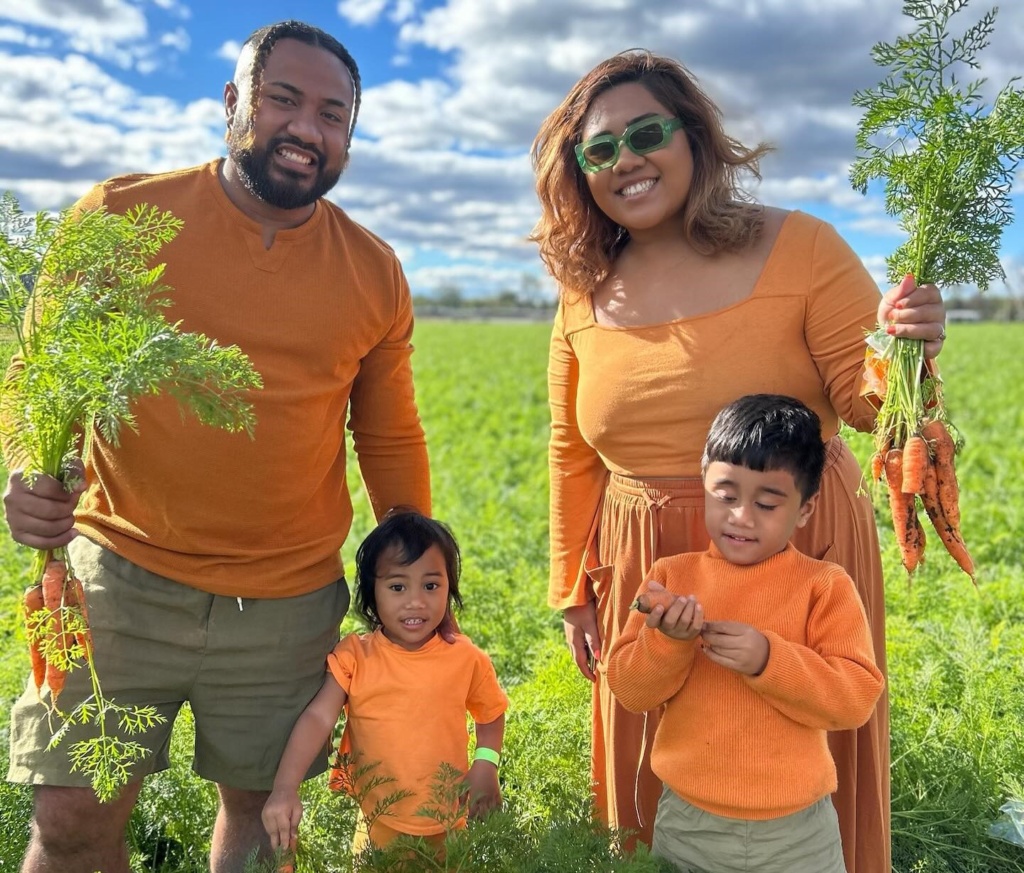
Kalfresh Vegetables throw open the doors to their farm and factory and welcome carrot-loving visitors each June!
See how they grow, pick, wash and pack carrots, as well as celebrate all things carrot with carrot juice, carrot sausages, carrot cake and carrot bread! Everyone can get their hands dirty with carrot picking on the farm, taking home as many as you can carry.
This year’s date has yet to be released, so keep an eye on Kalfresh’s social media channels for its official date. This is held on the Scenic Rim, at Kalbar on the Cunningham Highway in the Fassifern Valley.
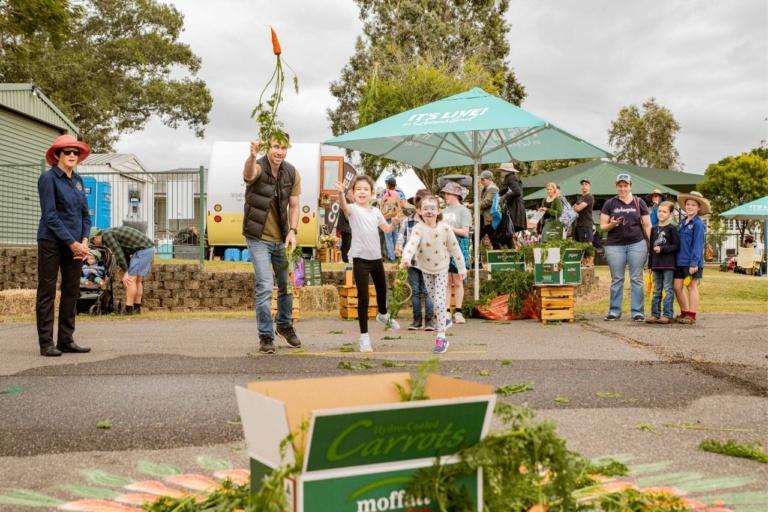
The Winter Harvest Festival is the Scenic Rim’s signature event where you can experience Eat Local Month in one glorious, flavour-filled day! Chefs, growers. producers, and artisans come together to showcase the region’s culinary treasures. There will be more than 60 market stalls offering fresh seasonal produce, local wines, beers and spirits, cheeses, meats, and more. Alongside these culinary delights, you’ll find a variety of handcrafted goods and local creations, all crafted by the region’s skilled artisans.
There are food displays, workshops, produce stalls and a huge festival environment where the children can take part in a variety of games, activities and food related fun.nteractive activities like tractor pulling, carrot tossing, and farm animal cuddles. They’ll enjoy face painting, garden games, and fun, educational experiences that teach them about agriculture and food in a hands-on way.
Don’t miss the annual Tractor Pull competition!
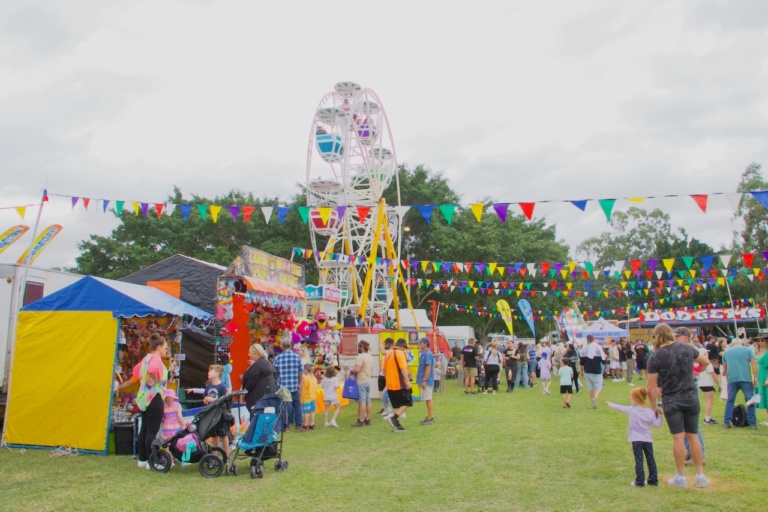
Where country meets the Gold Coast! Get up close and personal with cute animals, meet the farmers and exhibitors and taste delicious foods made from locally sourced ingredients. Watch the woodchop, and enjoy the equestrian program. Wander through the pavilions, check out the crafts and cooking, from honey to homebrew, lace to LEGO, fine arts to photography, and flowers to fruit sculptures and explore the best agriculture has to offer. Finish the day off with an incredible fireworks display!
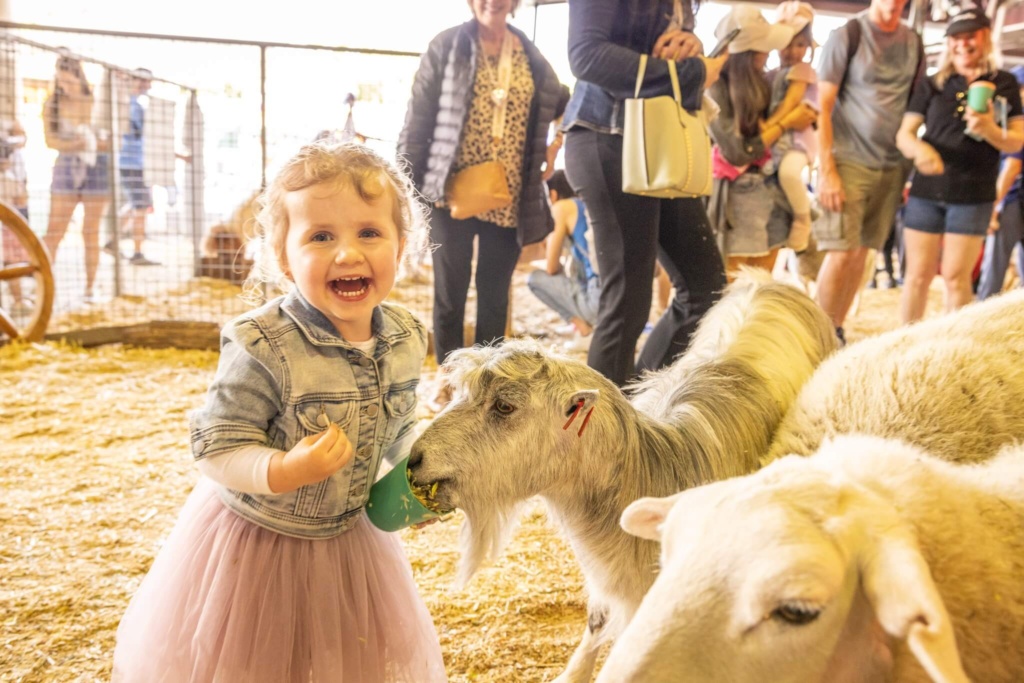
The Royal Queensland Show (Ekka) is Queensland’s largest and most loved annual event, now in its 149th year, bringing the country and the city together for a big celebration of agriculture. Enjoy competition entries from woodchop to giant vegetables, there’s 10,000 animals from beef cattle to cats and dogs, world-class live entertainment, award-winning food and wine, carnival rides and showbags, family shopping, educational activities and much more.

The Pacific Airshow Gold Coast is a three-day weekend event that features aerobatic demonstrations by the world’s best aviators. Attendees can join in meet and greets with the pilots, check out the family zone packed with aviation themed games and activities, and relax beachfront while watching paratroopers, stunt planes, helicopters, military planes and more from around the world perform.
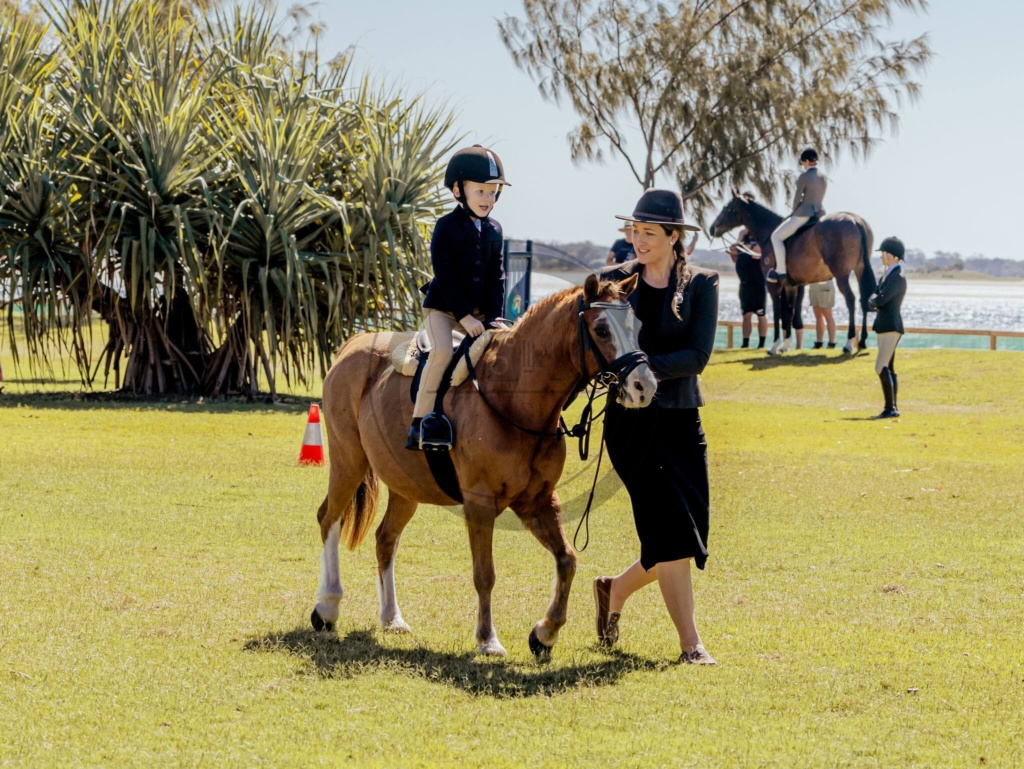
Immerse yourself in the family fun and excitement of the Gold Coast Show! Set on the beautiful Broadwater Parklands on the Gold Coast, this FREE show attracts tens of thousands of families annually. Enjoy woodchop, equestrian, food and beverage stalls, exhibits, games and rides. Each night also concludes with an incredible fireworks show.

Riverfire is Brisbane’s most spectacular night of the year. The launch event for the three-week Brisbane Festival, Riverfire brings families from across south-east Queensland to South Bank for a night that lights up the skies. Entertainment begins from 4pm, including an RAAF aerial display, with the main event – the state’s most spectacular annual fireworks display – lighting up the sky at 7pm.

RedFest is Redland City’s main event, showcasing musicians and artists from across the region. For two days, the Redlands Showground becomes a celebration of the amazing community, with performers sharing their skills across the showground. Families are also taken care of, with a children’s program, featuring a range of free activities including farm animals, puppet shows, rock climbing and free face painting, Sideshow alley and spectacular fireworks.
The date is still in the works, check RedFest’s social media channels for date confirmation.
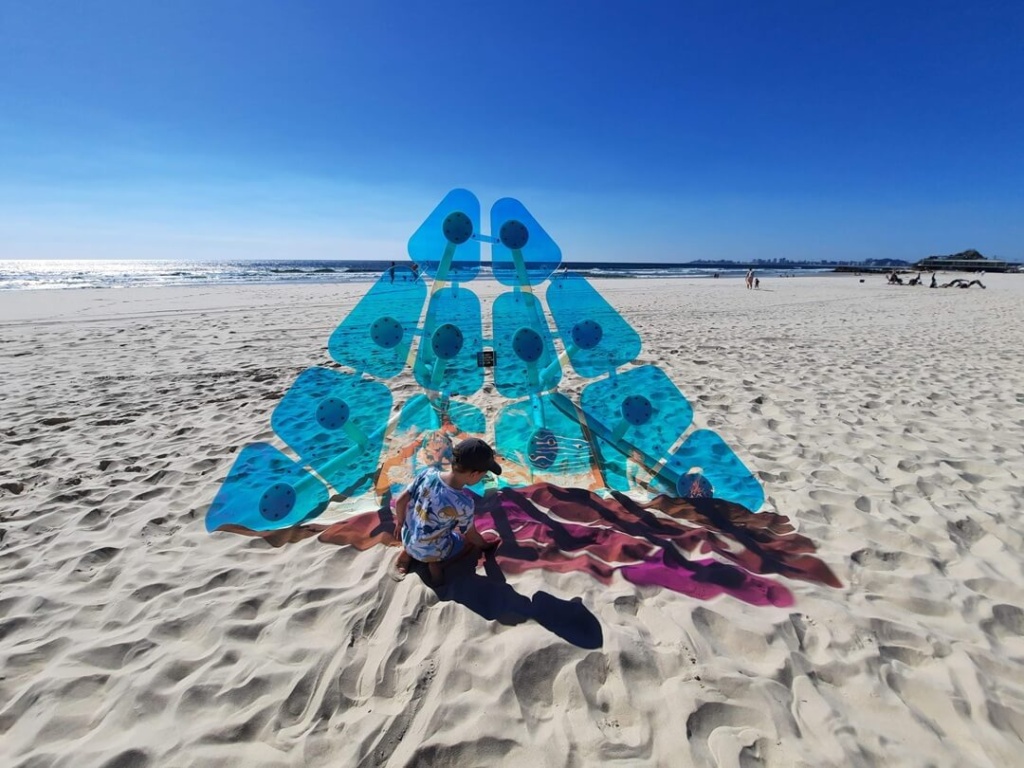
SWELL is Queensland’s premier outdoor sculpture exhibition, set along Gold Coast’s Currumbin Beach. For 10 days, more than 60 small, medium and large-scale sculptures will be set up along the beachfront and boardwalk for families to view.
The Family Zone activation is always popular, with workshops, activities, a BookFest setup where children can take home a free pre-loved book, live music and chill out zones set up under the leafy trees. Go at sunrise or sunset to beat the heat and experience the sculptures in a different light.
When considering how to look after your family during the work week, look no further than Little Scholars!
We offer your child the very best facilities, resources and early educational, play-based programs available, which are underpinned by the early years learning framework. We also believe in fun, wide-ranging experiences so that children can begin to develop interests and passions of their own, from Bush Kinder adventures to our broad extracurricular program which includes swimming for our kindergarten children, we believe in keeping wonder and magic in childhood.
Find Lara’s recommendations at her website Mrs. Lardeedah.com, and follow her socials Facebook and Instagram

The festive season is here and the opportunities to get in the spirit are endless! Why not check your shopping list off at a Christmas market, jingle along at a carols concert or putt your way through a Christmas wonderland. To make sure you do not miss out on the festive cheer, here is your go-to guide with only the best of the best Christmas happenings picked out for you. Be sure to add these dates to your calendar!
Get ready for an exciting and interactive Santa show! Join Santa, Mrs Claus and Rudolf for a Christmas extravaganza that includes a mix of traditional carols and current pop songs.
Pacific Pines Central Park, 4-8:30pm
Image via City of Gold Coast

This free family festivity will feature live music, market stalls, inflatable fun, local restaurant specials, games and activities, plus a visit from Santa Claus.
Ron Short Park, 4-8pm

Bring your family for the largest carols event on the northern Gold Coast, an unforgettable night with fireworks, food vans, and festive sing-alongs.
Brien Harris Oval, from 4pm
Image via Northern Gold Coast Carols Facebook page
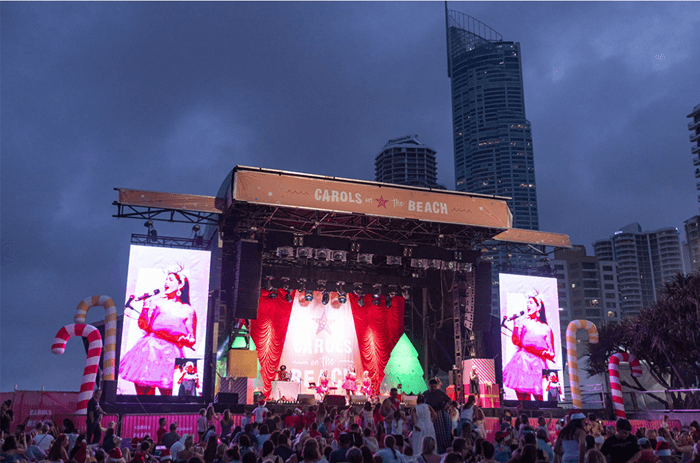
One of the all-time favourite Christmas carols will be performed in a 2-hour celebration of song and dance on the beach, with a visit from Santa, and a fireworks finale!
Surfers Paradise Beach, 5-8pm
Image via City of Gold Coast

Wind your way through the Market lanes to the sweet serenades of stunning live music, spot roving performers, snap a selfie with an elf… or meet Santa himself!
Home of the Arts, 4-9pm

The elves have been busy transforming the 9-hole mini golf course into a spectacular Christmas wonderland!
76-122 Napper Road, Parkwood

Free live music on stage, roving performers, children’s entertainment, fantastic food trucks, and Christmas market stalls. Plus see Santa making a special appearance alongside a fireworks display.
Ed Hardy Park, 4-8pm
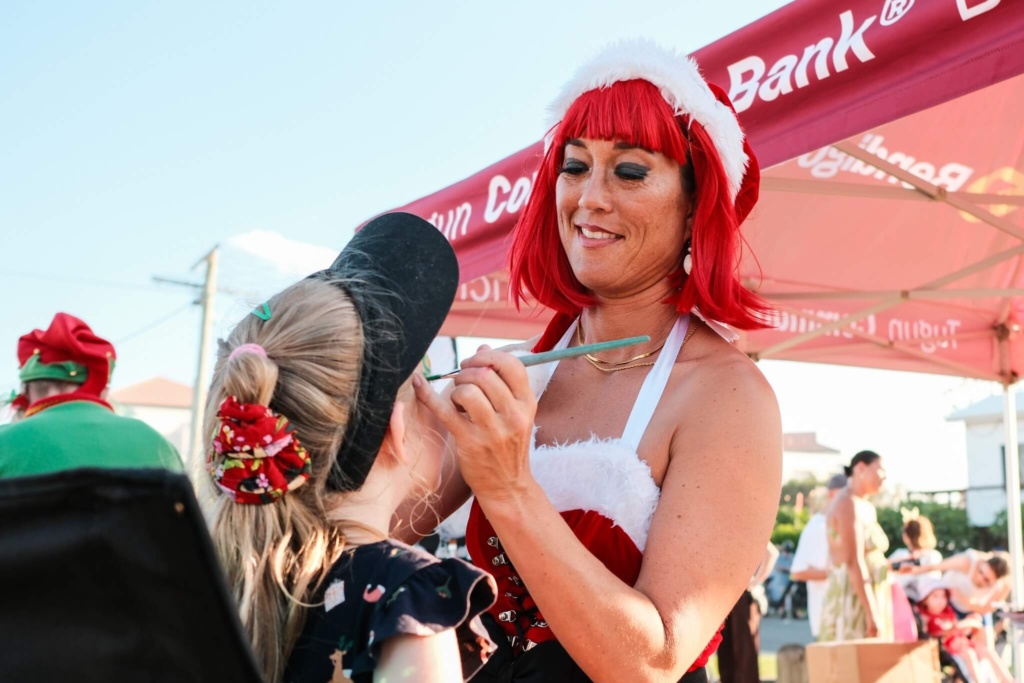
Dine under the stars at one of the fantastic local eateries, check out the local business offerings, and visit the Christmas market stalls. Plenty of free children’s entertainment on offer throughout the program with Santa making a special appearance!
Toolona Street, Tugan, 4-8:30pm

Sing along to your all-time favourite carols, enjoy a delicious assortment of food trucks, watch Santa fly in and watch a sparkling fireworks finale!
Queen Elizabeth Park, 5:30-7:30pm
Image via Shutterstock

A truly unique festive celebration, this event will feature live stage entertainment, Christmas carols, Santa, Fireworks over the beautiful Lake Orr and much more!
Waterfront Stage, Varsity Lakes, 4-8pm
Image via Carols on the Lake Facebook page

A fabulous, family Christmas event with market stalls, food trucks, Santa, Christmas carols, live music, facepainting and free children’s craft area.
Mudgeeraba Showgrounds, 3-8pm
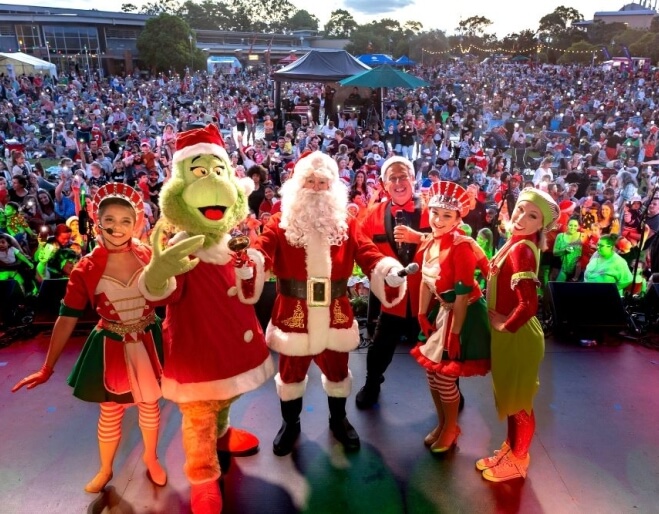
The City of Logan Christmas Carols is the city’s biggest annual Christmas event. This free, family-friendly event features hours of on-stage entertainment, festive activities, food trucks, and markets, all jam-packed into one magical day.
Kingston Butter Factory Cultural Precinct, 3-8:30pm
Image via Must Do Brisbane

Experience a pop-up Christmas market brimming with a variety of local vendors, a special visit from Santa’s elves, and Mr & Mrs Claus will drop by for photos under a larger-than-life wreath, suspended above the Market Hall.
Distillery Road Market, 11am-9pm
Image via Facebook event

A free 7-minute light and sound show running at 6:30pm, 6:45pm, 7pm & 7:15pm. Get ready to catch all the “bubble snow” at the end!
Image via Redland Performing Arts Centre
If you’re looking for early education and care for your young family, look no further than Little Scholars!
We offer your child the very best facilities, resources and early educational, play-based programs available, which are underpinned by the early years learning framework. We also believe in fun, wide-ranging experiences so that children can begin to develop interests and passions of their own, from Bush Kinder adventures to our broad extracurricular program which includes swimming for our kindergarten children, we believe in keeping wonder and magic in childhood.
Find Lara’s recommendations at her website Mrs. Lardeedah.com, and follow her socials Facebook and Instagram
We adore the endless stream of questions that little ones bring to us every day! From an early education standpoint, we want children to learn at every opportunity. Children are inquisitive beings, and they have lots to learn! At Little Scholars, we cherish this innate curiosity in children and strive to foster a lifelong passion for learning.
As parents and educators, we understand that some questions from our little ones can catch us off guard, leaving us searching for the right words to provide age-appropriate answers. We’re here to lend a helping hand, so let’s tackle a few of these tough questions together!
How are babies made/how did a baby get in a mummy’s belly?
Children at this age are curious about the beginning of life. You can answer simply, “A tiny seed, called sperm, from the daddy joins with a special egg from the mummy, and that’s how a baby starts to grow inside the mummy’s belly.” They may understand it like a fruit grows from a seed. For young children, this should satisfy the question. You may want to explain it’s not the same kind of egg we eat for breakfast!
What does dying mean?
The concept of death can be challenging for young children to grasp. We think it’s important to be honest here. You can say, “Dying means that a person’s body stops working, and they don’t feel pain anymore. They don’t breathe, eat, feel hungry or cold. It’s a natural part of life’s cycle, like when leaves fall from a tree in the autumn.” This is a topic that may be followed up with further questions, such as ‘will I die or will you die?’ and be honest. “Yes, we all die. But I hope to be around for a really long time. I have no serious illnesses that could change that.”
What happens to us when we die?
For toddlers and preschoolers, you can offer a comforting response like, “When someone dies, they become like a beautiful memory in our hearts. We remember all the happy times we shared with them, and they will always be a part of us.” If your family has cultural or religious beliefs around death, this may be the place to share, “in our family and our culture/religion, we believe when the body dies ______.” Your child may work through this further through their play, but just be there for them and prepared to revisit this topic.
How come Louis has two dads?
Children may notice different family structures. You can say, “Families come in all shapes and sizes. Louis is very lucky to have two dads who love and care for him just like your mummy and daddy love you.”
Why does Ashley’s mum live in a different house from her dad?
When answering a small child’s question about why a couple has divorced, we think a simple, honest, and age-appropriate response that takes their emotional well-being into consideration works best. Here’s one way to address the question: “Sometimes, mummies and daddies decide to live separately because they have found they feel happier when they have some space. It’s like when friends need some time apart.
If it’s your separation, your child will need a lot of reassurance from you. “Even though mummy and daddy won’t be living in the same house, we both still love you very much, and we will always be there for you. You will have special time with both of them, and we will continue to love and care for you in different homes.”
Young children may have a limited understanding of complex situations like divorce, so keeping the explanation simple and reassuring them of their parents’ love is crucial. Encourage them to share their feelings and questions, and assure them that it’s okay to talk about their emotions. Creating a supportive and open environment helps children navigate through changes and emotions in a healthy way.
What happened in the news that’s making everyone so sad?
Addressing sad news can be tricky. Open the discussion by asking your child what they know about what’s happened in the news. This is a good opportunity to correct false information and provide context. Remember to use age-appropriate language. Check your child’s understanding throughout the conversation and allow them to ask questions. You can say, “Sometimes, sad things happen in the world, and it can make people feel upset. It’s okay to feel sad or worried, and we can always talk about our feelings with someone we trust. You can always talk to me about anything.”
I’m scared, why is the weather so bad?
Living in Queensland, while wonderful most of the time, also means we face all kinds of weather events, such as flooding, bush fires and extreme heat, and cyclones. Unusual weather can be scary for young children, so it’s important to stay calm and make sure the information you give them is age-appropriate and simple to understand.
It’s natural for children to feel scared, so reassure them with calm and simple words. Acknowledge their feelings and let them know they are safe. You might say:
“I can see that you’re worried, and that makes sense. These weather events can be scary, but we are safe. People are working hard to protect us, and we keep learning how to stay even safer in the future.”
Thunderstorms
Thunderstorms occur when warm, moist air rises rapidly into cooler parts of the atmosphere. As the air cools, clouds and rain form. Inside the clouds, lightning, a form of electricity, builds up. When lightning strikes, it heats the surrounding air, causing it to expand quickly and create the sound of thunder – BOOM! At the same time, cooler air sinks toward the ground, leading to strong winds.
Cyclones
A cyclone happens when warm air over the ocean rises up, creating a low-pressure area that pulls in cooler air, making it spin around like a whirlpool, and as the air gets higher, it cools down and forms clouds, bringing heavy rain and strong winds; basically, it’s like a big spinning dance of hot and cold air over the sea! These winds and rain can cause damage, but this is why we have emergency services to help keep us safe, and life will eventually go back to normal.
Flooding
Floods happen when it rains heavily for a long time, causing rivers, canals, creeks and oceans to overflow and water to spread onto land that is normally dry. It’s a natural event, and not anyone’s fault, and that while sometimes scary, there are ways to stay safe and prepared!
Bush fires
Bushfires happen when dry conditions, high temperatures, and strong winds cause trees and grass to catch fire. Sometimes, they start naturally, like from lightning, and other times, they are caused by people. Firefighters and experts work hard to prevent and control them to keep people and animals safe.
Why is the sky blue?
The secret behind the blue sky lies in something called “Rayleigh scattering”. It’s a fancy scientific term, but it’s a super interesting phenomenon that helps us understand why the sky is blue. When sunlight enters the Earth’s atmosphere, it interacts with tiny particles like dust, water vapour, and pollen. This mixing causes the sunlight to scatter, or spread out, in all directions. When light waves hit these particles, they bounce off and scatter in different directions, just like water droplets scatter after you throw a rock into a pond.
Now you might ask, “Why is the sky blue and not another colour?” That’s because blue light has a shorter wavelength than other colours of light, like red or yellow. Shorter wavelengths scatter more easily when they interact with the tiny particles in the atmosphere. So, when we look up at the sky, we see more blue light than other colours.
But guess what? The sky isn’t always blue! Sunrises and sunsets are not only beautiful but also full of science. The colours we see during these times depend on the angle of the sun and the distance its light travels through the atmosphere. The lower the sun is in the sky, the more atmosphere the light has to pass through. This causes shorter wavelengths, like blue and green, to scatter more, leaving the longer wavelengths, like red and orange, to dominate the sky. That’s why we see those breathtaking colours during sunrises and sunsets!
Clouds, pollution, and weather can also change the sky’s colour, making it look grey, white, hazy, or yellow.
Where do birds go at night?
Children might wonder where birds go when it gets dark. You can say, “Birds have special nests or cozy spots where they rest at night, just like we have our beds to sleep in.
How do plants grow?
Children might be fascinated by the growth of plants and flowers. You can say, “The plants have roots at the bottom that absorb water and minerals in the ground, and then the stem starts growing. With the help of the sunlight, the stem grows in branches. Green leaves start growing out of the branches. The five things plants need to grow are sunlight, water, minerals, and food..
Why do we have seasons?
Seasons happen because the Earth goes around the sun. The Earth travels around the sun, called an orbit, once a year or every 365 days. As the Earth orbits the sun, the amount of sunlight each location on the planet gets every day changes slightly. This change causes the seasons. When it’s closer to the sun, it’s warmer, and when it’s farther away, it’s cooler.
Where does rain come from?
Children may be curious about rain and weather. Sunlight heats up water on Earth’s surface. The heat causes the water to evaporate/dry up into the sky, or to turn into water vapor. This water vapor rises into the air and makes up clouds. As the water vapor cools, it turns back into water, in the form of droplets or rain drops.
How do airplanes fly?
Little ones might be fascinated by airplanes in the sky. “Airplanes have special wings that help lift them into the air. When they move forward, the air goes over and under the wings, which creates lift and allows the airplane to fly.”
If they have follow-up questions, we liked the answers from Britannica Kids.
Why do I have to go to bed early?
Children may question bedtime rules. You can say, “Going to bed early helps our bodies and minds rest and get ready for a new day of fun and learning.”
Why do I have to eat vegetables?
Answer with something like, “Vegetables have special nutrients that help our bodies grow strong and healthy. They are like superhero foods for our bodies! We need a variety of food that have different types of nutrients so our bodies can get everything they need to be the best they can be.
How come your body doesn’t look like mine?
We bet you thought the puberty question would come later! But nope, your child has noticed there’s a slight difference between their bodies and their parents’ bodies. We know this can feel awkward to answer, but your child doesn’t understand why it could be hard for their parents to explain, so use proper words and keep it simple.
It’s okay not to have all the answers, and it’s perfectly fine to keep explanations simple and age-appropriate. If you don’t have the answers, you can look it up together. By embracing your child’s questions and engaging in open conversations, you’re nurturing their curiosity and building a strong foundation for their learning journey. Be sure to let your lead educator know you’re having these conversations at home. Your child is likely not the only one wondering some of these questions, and your educators can find ways to help them understand life’s curiosities!

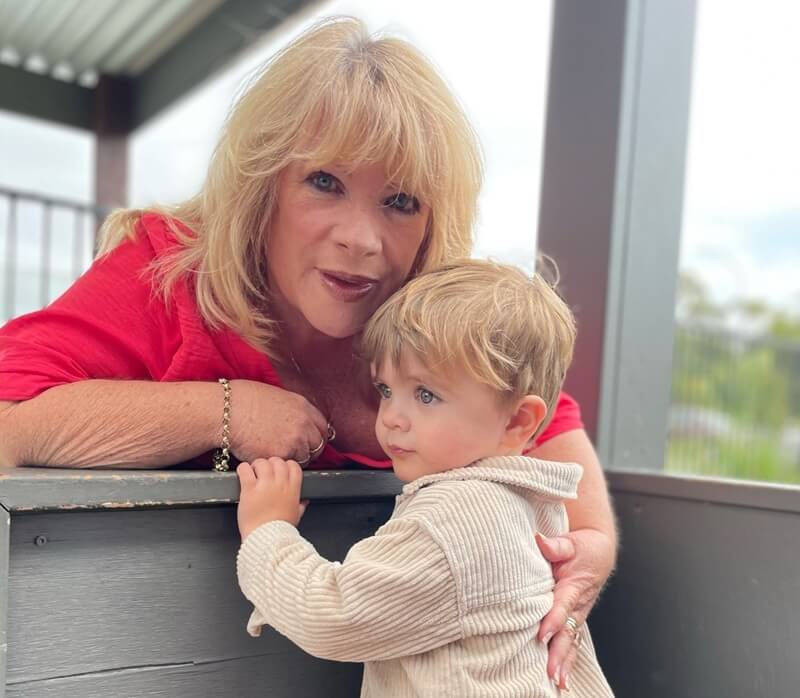
Grandparents have always shared a special bond with their grandchildren, but nowadays they are also playing an increasingly important role as a caregiver, as children spend much more time with their grandparents than ever before. Sometimes however, the generation gap can make it hard to think of new and fun things to do together that appeal to everyone.
Whether the grandchildren are spending an afternoon, a weekend, or the school holidays with you, this list is sure to keep children and grandparents of all interests and physical abilities, entertained and making memories year-round.
A beautiful day on the Gold Coast’s waterways make for some stunning views and great sight-seeing! The Gold Coast’s very own hop-on hop-off ferry is the perfect multi-generational way to spend a day. Departing hourly from five iconic Gold Coast destinations, including the famous Surfers Paradise and HOTA, Home of the Arts, you can hop on at any of the five stops, and stay aboard for the full loop (two hours) or explore the hop-off destinations at your leisure. Enjoy a drink from the onboard bar whilst the friendly captain keeps you entertained with informative commentary, music, local tips and wildlife spotting. Children can also meet the captain and have a turn driving the boat. There are a range of ticket options available, from day passes to long hops and short hops – depending on your budget and timeframes. Children under five always travel for free too!
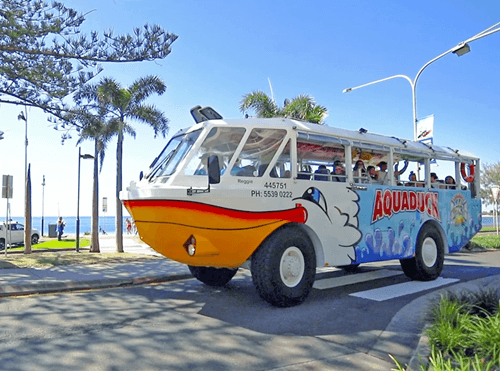
Another way to take to the water is with the iconic AquaDuck, and while it’s touristy, it’s a really great family outing, and perfect for multigenerational passengers. Embarking in the heart of Surfers Paradise, drive down the Esplanade overlooking the beautiful beaches and head towards The Spit. Once you reach the boat ramp just past SeaWorld, the tour changes pace and you’re heading for the water! Watch as the amphibious ‘duck’ changes from bus to boat and gently glides into the water. Now you’ll head through the Broadwater to check out how the millionaires live. You’ll finally return to land and drive down Tedder Avenue, before finishing back up at Cavill Avenue. The tour takes about an hour and is very family friendly, with children offered the chance to drive the boat and get their Captain’s certificate!
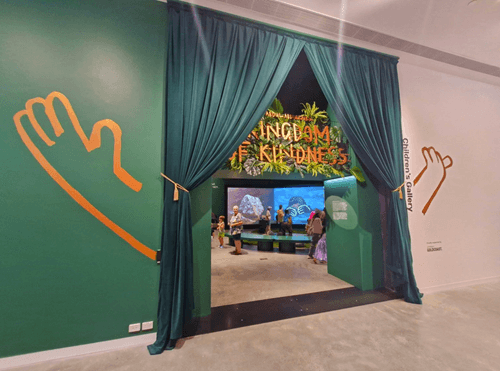
While the HOTA Gallery may be designed to cater for international art exhibitions, grandparents looking to give the grandchildren some culture will feel right at home! The Children’s Gallery at HOTA Gallery lets little artists get hands on – you won’t find any “do not touch” signs here! The Children’s Gallery changes every few months, each time offering a variety of interactive exhibits that complement the main galleries. After visiting the Children’s Gallery, take a stroll through the other free Galleries where you’ll find a few installations that are interactive and the children will love. Be sure to also ride the lift to the top floor and take in the Gold Coast skyline view! Fabulous 270 degree views await and there’s a guide you can use to work out what all the buildings are.
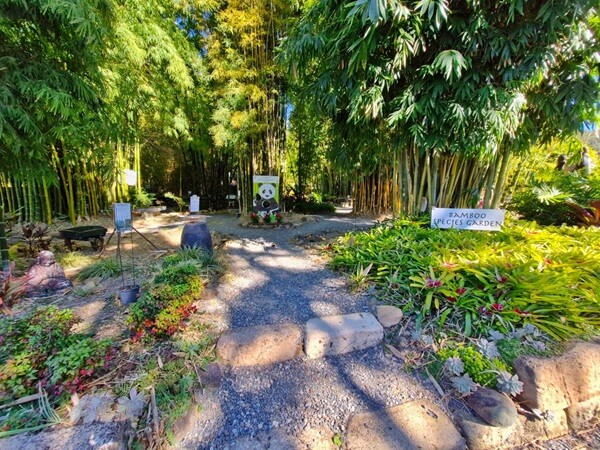
Bamboo Down Under at Wongawallan is a garden centre with a difference. The perfect grandparent’s day out, here you can explore a species garden, meditation garden, labyrinth, sensory garden and bamboo tunnel, and get bamboozled in the bamboo maze! Children can take on the Scavenger Hunt to discover the hidden pandas, all the while having a look at some incredible ornamental species of bamboo. Don’t miss the Rainforest Walk, a very peaceful stroll through a forest of enormous bamboo varieties. Dotted throughout are information signs about bamboo, little panda ornaments and other garden statues. Don’t miss the enchanted hollow at the end of the Tunnel.
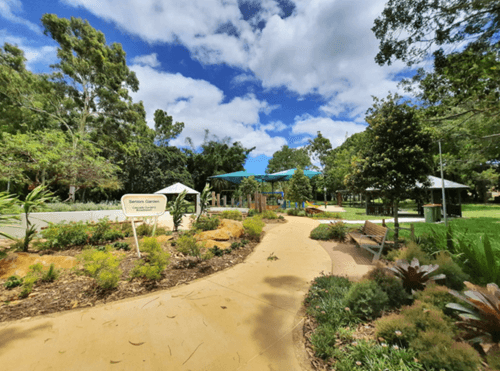
The Cascade Gardens at Broadbeach has a special addition of a sensory garden designed for seniors, but it also makes for great fun for little ones! In the sensory garden you’ll find elements including a musical gong, wayfinding design and productive gardens that encourage you to interact with the gardens through sight, touch and smell. It’s a beautiful addition to the Gardens and makes this spot perfect for multi-generational get togethers! The playground is older in style, but the children don’t seem to mind. You’ll find a flying fox, rope bridge, rock climbing wall and a carousel.
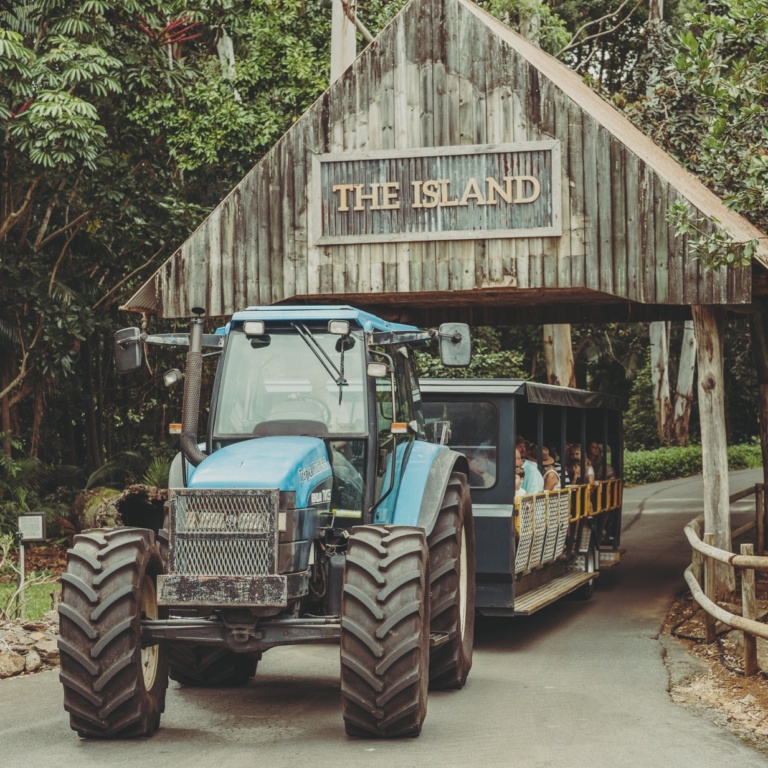
For the more active grandparents, a visit to Tropical Fruit World just over the NSW border in Duranbah is a fabulous day out for the family! Book a Farm Tour and experience a fruit tasting and a tractor-driven guided park tour. On the tour you can pick and eat bananas straight from the tree, crack macadamia nuts, feed and pat kangaroos, sheep, alpacas and miniature horses, and enjoy a short wildlife boat cruise too! At the end of the tour visit Wildlife Island and burn some energy on the flying fox, mini golf course and volleyball court. Then, check out the fruit market, café, and the huge sandpit by the grassed lawn to relax. If you live in the Tweed, Gold Coast, Byron, Lismore and Ballina, you can purchase tours at a discounted rate.
(Image with thanks to Tropical Fruit World)
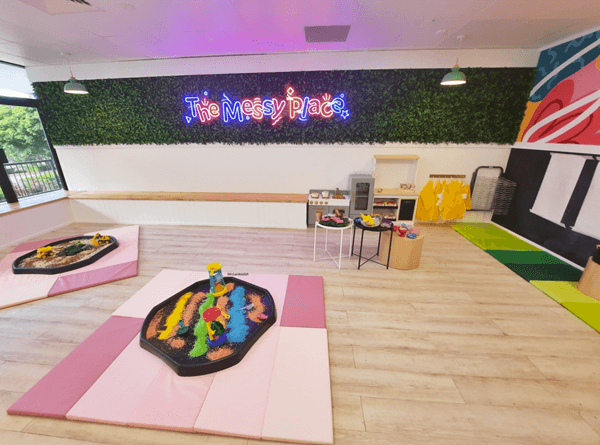
The generational gap can sometimes be hardest when the grandparents are tasked with spending time with energetic little toddlers. Keeping up with their ever-changing attention span, endless energy and natural curiosity is challenging for everyone! The Messy Place at Ashmore is the ultimate creative sensory play centre on the Gold Coast, designed exclusively for children under six years of age. They offer creative and messy play sessions in a safe and enjoyable environment, where they can unleash their imagination and make a mess. Exploration is encouraged, and grandparents can feel reassured being indoors in a secure, enclosed space. Sessions are booked on a casual basis and run five days per week.
National Grandparents’ Day is celebrated in Australia on the last Sunday of October. But as we all know, Grandparents Day is any day that the grandchildren can spend precious time with their grandparents. Whether you are a parent looking for how your child can have fun with grandma and grandpa or a grandparent seeking things to do with your grandchildren, we hope these ideas will inspire your time together.
We wholeheartedly believe in the proverb ‘it takes a village to raise a child.’ Little Scholars is proud to be a part of communities across South East Queensland, and we’re happy to play a small role in childhoods across the Gold Coast, Redlands and Brisbane.
We offer you and your child the very best facilities, resources and early educational, play-based programs available, which are underpinned by the early years learning framework. Our belief is that through quality education and care for children we can also encourage, assist and support the entire family.
Our dedicated team of educators are committed to the individual needs and interests of children and their families, and thus we encourage and welcome family input and involvement.
We aim to be like an extension of your family and are very relationship-driven. We support nurturing relationships between our educators and your child, the relationships your child has with the other children who attend, and we value our relationship with you as the parent and other family members. So book a tour today to get started!
Find Lara’s recommendations at her website Mrs. Lardeedah.com, and follow her socials Facebook and Instagram

While many Gold Coasters head to the southern suburbs on the weekend, the northern suburbs should not be overlooked for family-friendly weekend adventures! Starting in Stapylton and reaching to Pimpama, the most northerly suburbs of the Gold Coast also include Yatala, Alberton, Steiglitz, Gilberton, Norwell, Ormeau and Jacobs Well. Here you will find unique family activities, a range of family-friendly dining options, and some of the Gold Coast’s most unique play spaces. Here is your guide to getting the most out of a day in the Northern most parts of the Gold Coast.
South-east Queensland’s last original open-air Drive-In Cinema is located in Yatala, and boasts three massive screens accommodating up to 700 cars each night. Bring your camp chairs and sit out the back of your car to watch a movie, or bundle up the blankets, pillows and sleeping bags to make yourself comfortable in the back of your van, ute or car. Perfect for wriggly children, the privacy of sitting in your own vehicle means there is no need to worry if their bouncing around is bothering other cinema patrons. Movies screen every night of the week and they often host special event screenings too.
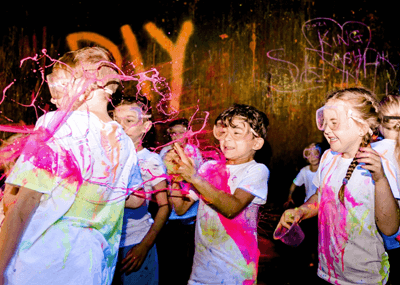
If your family is feeling creative, or looking to get messy, a workshop at DIY Invasion is sure to tick the box. Located at Staplyton, DIY Invasion run craft workshops ranging from resin art to painting, macrame and slime making – with their School Holiday Workshops always extremely popular for children. Another unique feature is their Splatter and Splash Room, which families can book for a private experience! Choose your own dance music, while letting your creativity run wild as you fling, flick, and splash paint around the room and over your fellow participants! This is a great space to unwind and tap into creativity.
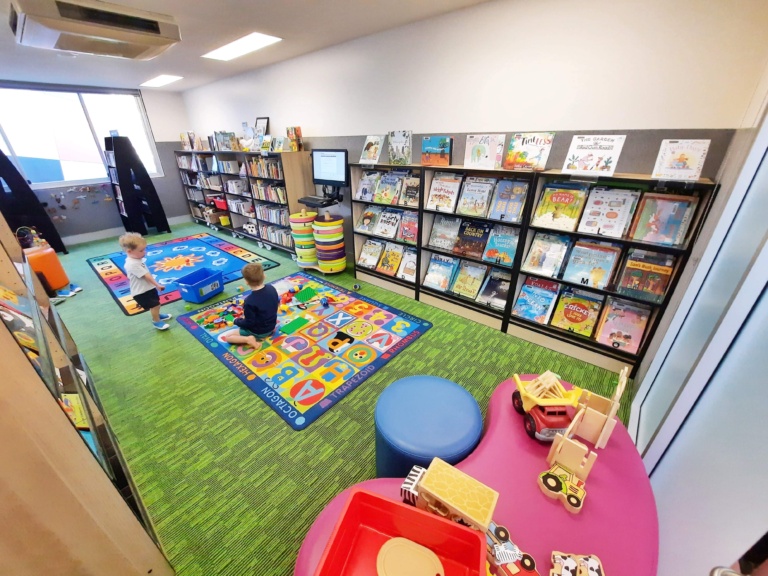
The only library located in the far northern suburbs, the Ormeau Community Lounge & Library is a hidden gem. Here you can visit the Gold Coast’s only Book Box corner, an early year’s library and play-based learning space delivered in partnership with Queensland State Library’s First 5 Forever program. Here children do not have to worry about being quiet, and they are actively encouraged to play with the many games and play resources available. Open six days a week, families can join in Story Time on Friday and Saturday mornings, or participate in Baby Rhyme Time and Toddler Time sessions during the week.

Distillery Road Market is a fresh and exciting new venue located in Eagleby, home to The F.E.D, a 2000-person food and entertainment space. Here you’ll find an expansive indoor/outdoor dining area, with a range of on-site eateries to choose from. Open Thursday – Sunday, the venue is family friendly with live music each evening and long beerhall-style tables to choose from. The best part is that diners can choose meals from six different food outlets, meaning that all tastes and dietary requirements can be catered for! The casual vibe of this venue is perfect for an early dinner with the family, where children and parents can relax, move around, dance and enjoy a great meal together.
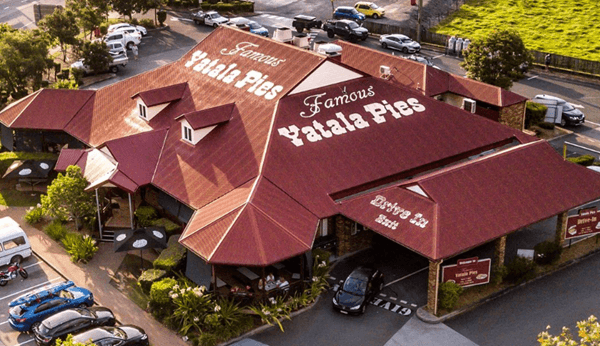
Yatala Pies has been a landmark in the Yatala area for more than 130 years, these days selling around 3,500 pies daily! Well known as a halfway stop on the journey between Brisbane and the Gold Coast, northern Gold Coast locals are lucky to have this icon right here in their backyard. Selling some of the best pies on the Gold Coast, the quality is exceptional and the range delicious. Choose from dine in or takeaway, you can grab a hot, ready-to-eat snack pie, or take-home, oven-ready family pies and snack pie packs. With something for everyone, the family will love a stop in at Yatala Pies any time of the day.
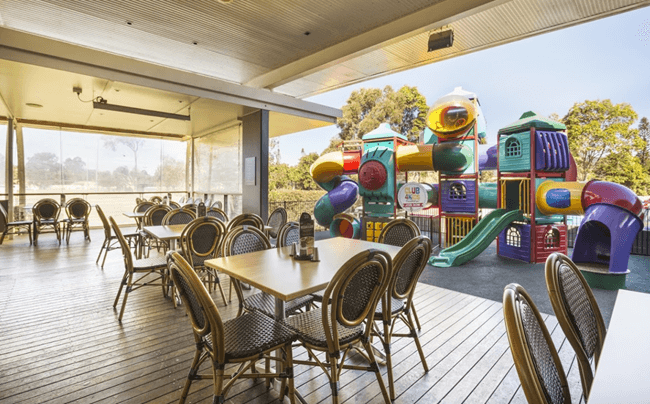
The Norfolk Tavern has got to be the most family-friendly dining option in the northern Gold Coast. Indoors you will find a bright and spacious dining room, while outside there is a wraparound veranda with ample space for dining, opening on to a huge children’s playground. The award-winning Bistro has menu options to suit every taste, from fresh seafood to steaks, pastas, salads and all the traditional pub fare. Extremely popular on weekends, be sure to book a spot on the deck if you are dining with children for easy line of sight from your table to the playground.
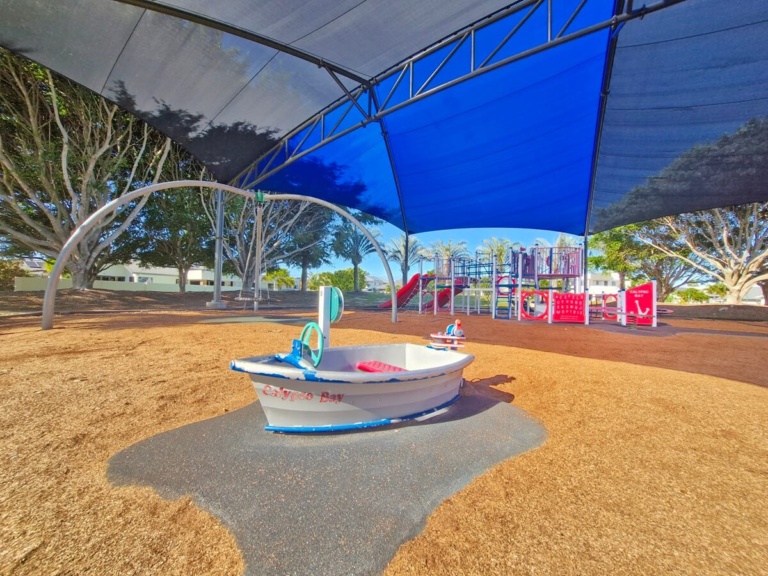
A nautical themed playground appropriate for its position by the water and close by the Calypso Bay Marina, here you’ll find a pirate ship brimming with bridges, wheels, slides and nets – be careful, you might even be asked to walk the plank! Underneath the pirate ship the imaginative play space is further extended, with a small shop counter set up, tunnel frames and other interactive game panels. The swing set with all abilities swing is always popular, as is the spinners and hammock swing. There’s also a little boat for children to pretend to fish or start the engine!
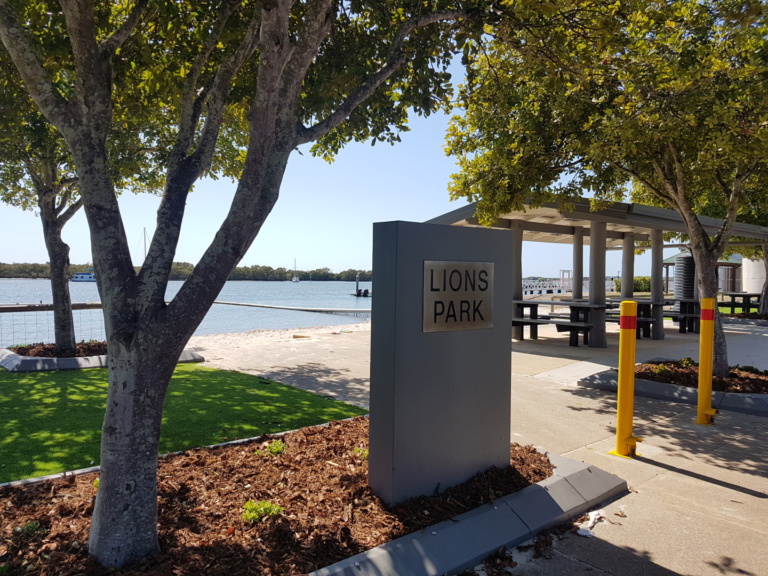
While many think the most northern beach area for children to swim is at Paradise Point, there is a lesser-known spot at the very northern edge of the Gold Coast – Lions Park at Jacobs Well. With easy access from the carpark, you are at a small, shaded beach in just a few steps. The swimming enclosure here has a small sandy beach, a large shade sail over the sand, and few waves, making it ideal for toddlers and younger children gaining confidence in the ocean. Parents will love the ability to sit on a blanket under the shade and still be close enough to their children in the water.
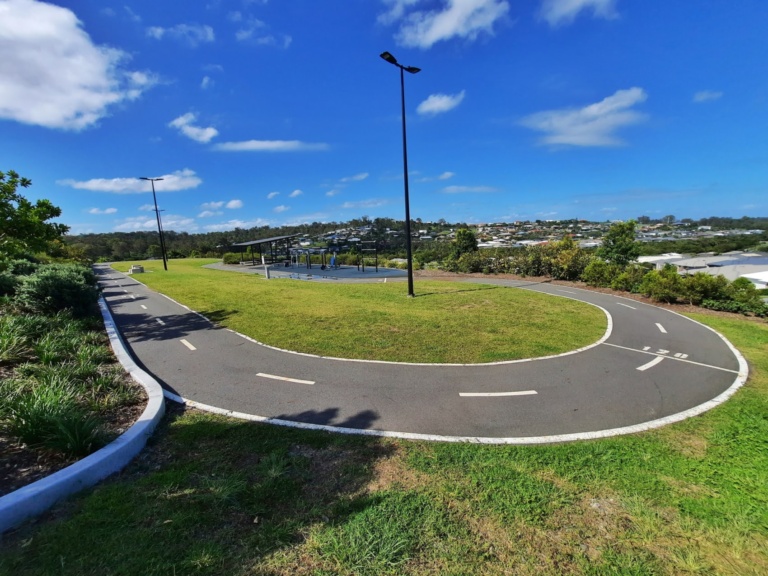
While the playground at Outlook Park, Ormeau may be tiny, pack the bicycles and prepare yourselves for the surprise bike tracks that make this a fabulous spot to visit! Set on a steep slope, Outlook Park is laid out over three levels. At the top you’ll find a small playground best suited for toddlers, and then on the middle and lower level there are two bike tracks, perfect for racing on. While the playground is very small, the bike tracks are great for bicycles, skateboards or scooters, and children will love lining up at the start line and racing the loops to the finish. Celebrate with some pretend play medal ceremonies on the dais at the track!
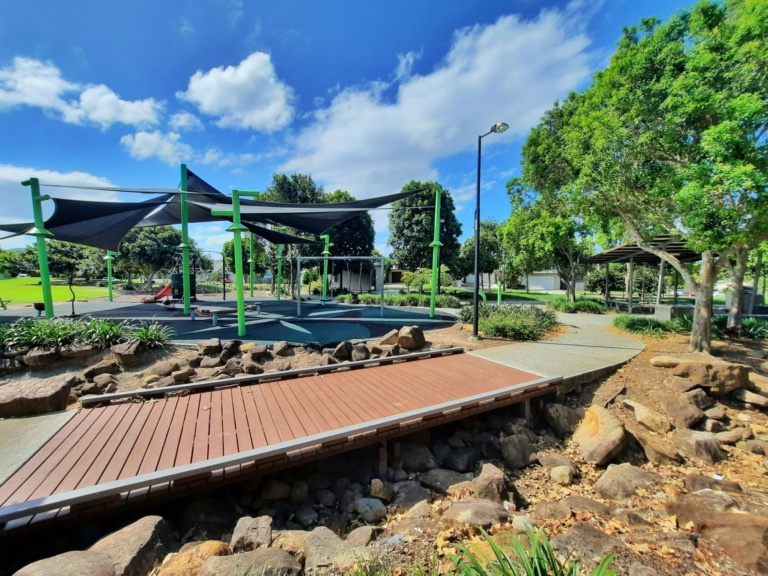
Hilltop Park in Ormeau is an older park, but still delivers a great time. Split into two sections, toddlers will love the smaller, shady play area with a car, climbing frame and mini playground with slide and swing. The main playground space is better suited for children over five, with a larger playground and slide, large climbing net, balance beams, spinners and swings. Children can also climb the ramp up to the old water tower, which has been converted into a play structure.
The northern Gold Coast offers a variety of unique and exciting activities for the whole family. From classic drive-in movies to hands-on creative workshops, scenic playgrounds, and delicious dining options, these suburbs have something for everyone. Whether you’re looking for a relaxing day by the water or a more adventurous outing, there’s no shortage of fun to be had. Next time you’re planning a family day out, consider exploring the hidden gems of Stapylton, Ormeau, Yatala, and beyond—you might just discover your new favourite weekend spot!
Little Scholars provides quality early education and care for children across South East Queensland, including five early learning campuses in Stapylton, Yatala and Ormeau.
We offer your child the very best facilities, resources and early educational, play-based programs available, which are underpinned by the early years learning framework. We believe that through quality education and care for children, we can also encourage, assist, and support the entire family.
Our dedicated team of educators are committed to the individual needs and interests of children and their families, and thus we encourage and welcome family input and involvement.
Find Lara’s recommendations at her website Mrs. Lardeedah.com, and follow her socials Facebook and Instagram
Let us hold your hand and help looking for a child care centre. Leave your details with us and we’ll be in contact to arrange a time for a ‘Campus Tour’ and we will answer any questions you might have!
"*" indicates required fields
Let us hold your hand and help looking for a child care centre. Leave your details with us and we’ll be in contact to arrange a time for a ‘Campus Tour’ and we will answer any questions you might have!
"*" indicates required fields